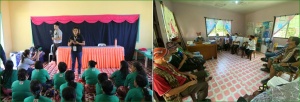
Balut island in the Municipality of Saranggani in Davao Occidental is classified as Geographically Isolated and Disadvantaged Conflict-Affected Area or GIDCA. As such, the area faces various challenges including the inaccessibility of most social services to the residents who belong to the B’laan and Sangil tribes.
Incidence of violence
Domestic violence has been reported in Balut Island, with sexual abuse accounting for 16 of the 39 reported cases from 2017-2022 documented by the Philippine National Police (PNP) – Women and Children’s Protection Desk (WCPD) Office of Sarangani. This was followed by violence against women and children (VAWC).
For a hard-to-reach and indigenous community like Balut, the statistics is alarming, especially so that their culture dictates that they follow the IP socio-political mechanism system of settling disputes.
Without any intervention, cases may proliferate with perpetrators continue to roam around the community and victims are left to suffer in silence.
The situation in the island, however, did not go unnoticed for this dedicated Pantawid Pamilyang Pilipino Program (4Ps) staff, 4Ps Municipal Link, Gemma Gulanguyan, who initiated interventions to address this gender issue.
With Gender and Development (GAD) harmonized within the implementation of programs and services of the DSWD, the 4Ps worked on the problem.
After subjecting Balut Island to an assessment and based on the Gender Red Sites Report, gender based violence in the area was noted to be high, with identified cases of child sexual abuse and exploitation as rampant, and some incidence occurring in commercial vessels sailing to and from the island.
Birth of the DSWD GAD initiative
With the situation getting clearer, it became apparent that the local government unit (LGU) and the DSWD had to urgently raise awareness on GAD in Balut Island.
DSWD Field Office XI wasted no time in initiating GAD innovations as it implemented the 4Ps program to ensure the protection of the women and children.
The Sarangani 4Ps municipal link used the GAD mapping tool to identify specific gender issues in Balut island and to have a comprehensive idea of how to respond. Focus group discussions were initiated by 4Ps with the LGUs, Department of Education, Department of Health, PNP, and the barangay to address VAWC, and sexual abuses, among others.
Aside from partnering with 4Ps stakeholders on GAD intensified initiatives, DSWD FO XI also coordinated and sought the intervention of the Municipal Tribal Council “KASFALA,” in the proper resolution of cases. This is to ensure that the traditional practices and autonomy of the Indigenous Peoples are respected, and do not hinder the development of the women and children.
Through the 4Ps implementation, capacity building activities on child sexual abuse were conducted for the 4Ps beneficiaries, stakeholders, community members, and community leaders, as well. Among these activities were the orientation on gender laws, anti-human trafficking, and the United Nations Convention on the Rights of the Child.
The 4Ps parent leaders also participated actively in the initiatives as they advocated for the campaign against VAWC, gender and development, and even attended municipal inter-agency meetings to champion the cause.
Instituting changes
As a result of the initiatives of the Department, GAD responsive policies and changes were instituted in Balut Island, and even in Sarangani.
With the people in Balut island made aware of GAD concepts, societal changes started to take shape. The GAD mapping tool identified the women and children who were victims of violence, including the children who were frequently absent in school. Consequently, they were provided with appropriate interventions.
A case of a child humiliated by a teacher for not being able to read was also identified through the mapping. The case was then elevated to the school district in Davao Occidental and the teacher was dealt with accordingly.
Moreover, GAD responsive ordinances were formulated and a Local Council against Trafficking-Violence Against Women and Children (LCAT-VAWC) was created.
Local policies were enacted and Child Protection Policy (CPP) was instituted in schools to ensure gender sensitivity and awareness among the teachers and the students.
Awarded best practice
With its impact in Balut island, the comprehensive GAD initiative entitled, “Nagkakaisa sa Isla”, was adjudged as Best Practice in Peace and Security by the Philippine Commission on Women (PCW) and the National Anti-Poverty Commission (NAPC) during a recently held national conference on women.
With peace and security regained, complemented by the continuing development work of the DSWD in the area, the locals are hopeful that progress is not far behind for this island barangay. ###


